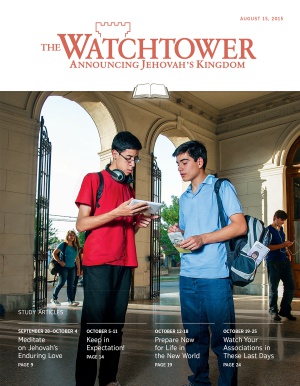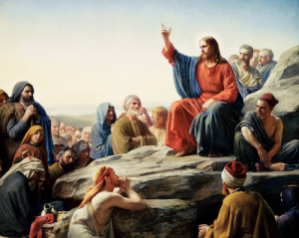Baruq
“Keep in Expectation!”
Watchtower’s study article of week 5 to 11, October 2015
The study of the Watchtower this week has encouraged us to keep in expectation, as the prophet Habakkuk incites.
Like the servants of God in ancient times, we, as Jehovah's Witnesses, also live in the expectation of the achievements of the biblical prophecies. We await the coming of the messianic kingdom that will put an end to human suffering thanks to the liberation of Jehovah’s people.
However, some Christians await the arrival of the kingdom and the end of this wicked worlds for decades. Should they despair?
We can not deny that the Society has always encouraged us to wait, arguing that the end is for the near future. She also showed some impatience when she announced the end at different times, e.g 1914, the post-war period in the forties or in 1975. Since then, the Watchtower is cautious about giving dates; as Christians, we must not serve for a date but it is the love we feel for Jehovah that should guide us. But have we shouted “wolf” once too often?
We should have good reason to expect because we live in the period that sees the presence of Christ since 1914. This includes the sign of worsening global conditions and the preaching work. Jesus did not say how much would last this time before the end. But someone might still wonder if Jesus had in mind such a long period, more than a century! Are we really sure that the sign is fulfilling before our eyes? Yes, as the fifth paragraph encourages us, we have to be vigilant and watchful and not to disclose a teaching contrary to that contained in the Word of God.
Without question 1914 was a crucial strategic turning point in world history. Because by means of chronology the International Bible Students had already been anticipating earthshaking events to commence in 1914, the start of the First World War seemed to confirm their expectations. In fact, many of the Bible Students were certain Armageddon was then imminent. But was that date, now nearly a century in our past, “the most important date for all human creation,” as the Watchtower once claimed? if the kingdom of the world actually gave way to Christ’s kingdom in 1914, why do the nations still exercise total domination over the earth? What has changed since 1914? Clearly, as regards the political nations of this world doing as they please, nothing has changed.
It is with reason that the sixth paragraph suggests that the term "conclusion of the system of things" refers to a future period during which the global conditions worsen. It is clearly said: "We can expect that world conditions, bad as they are now, will continue to decline."
Unfortunately, in total contradiction with the biblical teachings, paragraph seven greatly reduces the extent of this deterioration of world conditions. It is true that Jesus compares the presence of the son of man at Noah's day. The men were eating, drinking, marrying, until the flood came and swept them away. They were not aware of anything, as the Lord tells us. But does that mean that the living conditions were good? Or then, eating, drinking, marrying, all this could not be a way to forget what was happening on the earth at the time? Because it is unlikely that Jehovah has decided to destroy a world that, in sum, was not so bad. The coming of the flood ended an iniquitous world, evil, wicked and that had reached a point of no return. Can we only imagine what would have happened on earth in the hands of powerful fallen angels and their horrible offspring if the flood had been delayed for some time? The Nephilim, whose name means fellers or those who cause others to fall down, had filled the earth with violence, murder and blood. Is it unreasonable to believe that this race wanted to have strict control of the earth, perhaps eliminating humans, or reducing them to a few? Was life pleasant for those who lived in that period? Can we not believe that God tried to save the maximum of the people before causing the waterfall? There is not so blind as the one who refuse to see. How many were those who did not get on the ark, perhaps for fear of reprisals, by family attachment, or for any other reason? The evil angels and their sons have surely done their utmost to prevent their contemporaries to realize that the hour of judgment had come.
So, how things will be in the end time? Jesus said that men will become faint out of fear. According to Luke, “there will be signs in sun and moon and stars, and on the earth anguish of nations, not knowing the way out…”
Become faint out of fear, anguish, here are terms indicating a world beset by torments but that until the last moment refuse to notice the judgment that is coming on him, just like in Noah’s days.
Paragraph eight speaks of the “composite sign, the fulfillment of it would have to be obvious enough to command attention o those who keep on the watch.” If this sign is evident since 1914, it is not a limited period as the study says, but quite a long time, isn’t it? In addition, if the First World War marked the beginning of the end and fulfilled "nation against nation, and kingdom against kingdom," when has been realized the early part of the prophecy of Christ: “When YOU hear of wars and disorders, do not be terrified. For these things must occur first, but the end does not [occur] immediately.”? Before 1914? Besides the fact that the Watchtower recognizes that the world then knew an era of peace, it does not seem that there was no reason to panic because of rumors of wars. For forty years, the Bible Students had mentioned 1914 as being a year marked and no one expected the end before.
So, we must keep in expectation?
Of course. Because even if the biblical prophecies are yet to be realized, we do not know neither the date, nor the hour. We must be vigilant. Prophets have sometimes waited decades before seeing the fulfillment of their prophecies. And some do not even seen it.
While encouraging us to wait, the Society rather risk to let us falling asleep by announcing that the judgment will start with the attack of Babylon the Great, identified as the world empire of false religions, when the judgment begins with the house of God, in his temple, as explained in several pages on this site.
So yes, let us continue to serve Jehovah with a sense of urgency, paying attention to the prophecies which certainly will not take long to complete.



